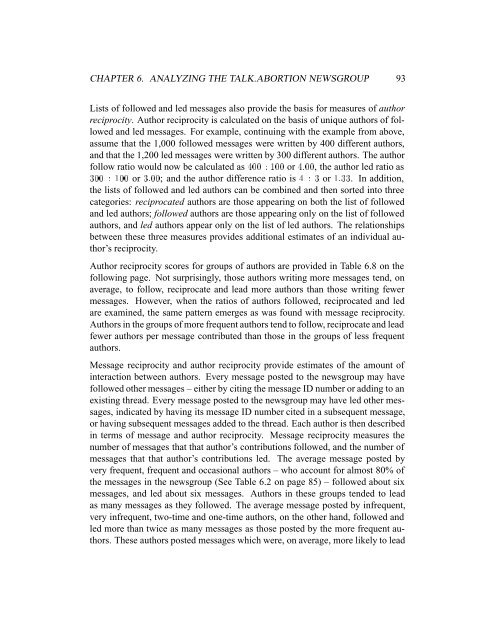Expanding the Public Sphere through Computer ... - ResearchGate
Expanding the Public Sphere through Computer ... - ResearchGate
Expanding the Public Sphere through Computer ... - ResearchGate
You also want an ePaper? Increase the reach of your titles
YUMPU automatically turns print PDFs into web optimized ePapers that Google loves.
CHAPTER 6. ANALYZING THE TALK.ABORTION NEWSGROUP 93<br />
Lists of followed and led messages also provide <strong>the</strong> basis for measures of author<br />
reciprocity. Author reciprocity is calculated on <strong>the</strong> basis of unique authors of followed<br />
and led messages. For example, continuing with <strong>the</strong> example from above,<br />
assume that <strong>the</strong> 1,000 followed messages were written by 400 different authors,<br />
and that <strong>the</strong> 1,200 led messages were written by 300 different authors. The author<br />
follow ratio would now be calculated as 400 : 100 or 4:00, <strong>the</strong> author led ratio as<br />
300 : 100 or 3:00; and <strong>the</strong> author difference ratio is 4 : 3or 1:33. In addition,<br />
<strong>the</strong> lists of followed and led authors can be combined and <strong>the</strong>n sorted into three<br />
categories: reciprocated authors are those appearing on both <strong>the</strong> list of followed<br />
and led authors; followed authors are those appearing only on <strong>the</strong> list of followed<br />
authors, and led authors appear only on <strong>the</strong> list of led authors. The relationships<br />
between <strong>the</strong>se three measures provides additional estimates of an individual author’s<br />
reciprocity.<br />
Author reciprocity scores for groups of authors are provided in Table 6.8 on <strong>the</strong><br />
following page. Not surprisingly, those authors writing more messages tend, on<br />
average, to follow, reciprocate and lead more authors than those writing fewer<br />
messages. However, when <strong>the</strong> ratios of authors followed, reciprocated and led<br />
are examined, <strong>the</strong> same pattern emerges as was found with message reciprocity.<br />
Authors in <strong>the</strong> groups of more frequent authors tend to follow, reciprocate and lead<br />
fewer authors per message contributed than those in <strong>the</strong> groups of less frequent<br />
authors.<br />
Message reciprocity and author reciprocity provide estimates of <strong>the</strong> amount of<br />
interaction between authors. Every message posted to <strong>the</strong> newsgroup may have<br />
followed o<strong>the</strong>r messages – ei<strong>the</strong>r by citing <strong>the</strong> message ID number or adding to an<br />
existing thread. Every message posted to <strong>the</strong> newsgroup may have led o<strong>the</strong>r messages,<br />
indicated by having its message ID number cited in a subsequent message,<br />
or having subsequent messages added to <strong>the</strong> thread. Each author is <strong>the</strong>n described<br />
in terms of message and author reciprocity. Message reciprocity measures <strong>the</strong><br />
number of messages that that author’s contributions followed, and <strong>the</strong> number of<br />
messages that that author’s contributions led. The average message posted by<br />
very frequent, frequent and occasional authors – who account for almost 80% of<br />
<strong>the</strong> messages in <strong>the</strong> newsgroup (See Table 6.2 on page 85) – followed about six<br />
messages, and led about six messages. Authors in <strong>the</strong>se groups tended to lead<br />
as many messages as <strong>the</strong>y followed. The average message posted by infrequent,<br />
very infrequent, two-time and one-time authors, on <strong>the</strong> o<strong>the</strong>r hand, followed and<br />
led more than twice as many messages as those posted by <strong>the</strong> more frequent authors.<br />
These authors posted messages which were, on average, more likely to lead
















